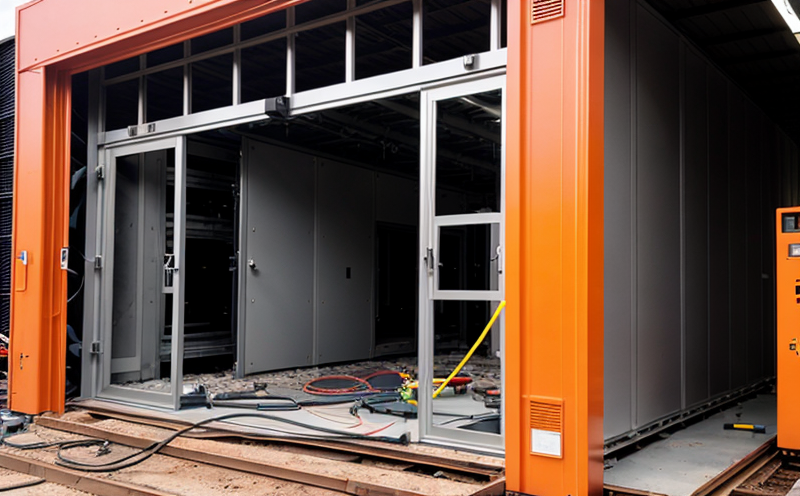UL 2271 Thermal Safety Testing of Batteries for Light Electric Vehicles
The UL 2271 standard is a critical pillar in ensuring that batteries used in light electric vehicles (LEVs) are safe and reliable. This standard focuses specifically on the thermal safety testing of batteries, which is essential to prevent overheating incidents that could lead to fires or explosions.
UL 2271 covers a range of tests designed to simulate real-world conditions under which battery cells in LEVs may encounter extreme temperatures and other stressors. These tests are conducted to ensure the battery's ability to withstand such stresses without compromising safety or performance. The standard is particularly important for manufacturers, quality managers, compliance officers, and R&D engineers who need to adhere to stringent safety regulations.
The testing process involves subjecting batteries to various thermal stress conditions, including temperature cycling, heating, and cooling cycles. These tests are conducted in controlled laboratory environments that replicate real-world conditions as closely as possible. The primary goal is to identify potential weaknesses or vulnerabilities within the battery's design that could lead to thermal runaway.
The UL 2271 standard ensures that all batteries used in LEVs meet rigorous safety requirements, thereby protecting both the vehicles and their users from hazards associated with overheating. Compliance with this standard not only helps prevent accidents but also builds consumer trust and confidence in the product's reliability and safety.
During testing, various parameters are monitored to ensure that the battery maintains its integrity under thermal stress. These include voltage, temperature, internal resistance, and other critical metrics. The test data is meticulously recorded and analyzed to determine whether the battery meets all specified criteria for safe operation.
The UL 2271 standard applies specifically to lithium-ion batteries used in LEVs. It provides detailed instructions on how to conduct these tests, including the types of equipment required, specimen preparation procedures, and acceptance criteria. Compliance with this standard is mandatory for manufacturers seeking certification that their products meet international safety standards.
By adhering to UL 2271, manufacturers can ensure that their batteries are safe not only during normal operation but also under extreme conditions. This proactive approach helps prevent potential hazards and demonstrates a commitment to safety and quality.
Applied Standards
- UL 2271: Standard for Safety of Batteries for Light Electric Vehicles
- ISO/IEC 80079-32: Explosive atmospheres - Part 32: Design and construction of electrical apparatus intended to be used in explosive atmospheres
The UL 2271 standard is part of a broader set of standards that govern the safety of batteries for light electric vehicles. This standard specifically addresses thermal safety testing, which is crucial for preventing overheating incidents and ensuring reliable performance under extreme conditions.
Other relevant international standards include ISO/IEC 80079-32, which provides guidelines on the design and construction of electrical apparatus intended to be used in explosive atmospheres. These standards work together to ensure that batteries for LEVs meet rigorous safety requirements, protecting both users and the environment.
Eurolab Advantages
- Comprehensive Expertise: Our team of experts has extensive experience in conducting UL 2271 thermal safety tests for batteries used in light electric vehicles.
- State-of-the-Art Facilities: We possess the latest laboratory equipment and infrastructure necessary to perform these complex tests accurately and reliably.
At Eurolab, we pride ourselves on providing top-tier services for battery testing. Our comprehensive expertise ensures that our clients receive accurate and reliable results every time. With state-of-the-art facilities, we can conduct a wide range of tests to meet the strictest industry standards.
We are committed to helping manufacturers ensure their products comply with UL 2271 and other relevant safety standards. Our team works closely with clients throughout the testing process, providing guidance and support every step of the way. By choosing Eurolab, you can be confident that your batteries will undergo thorough testing to meet all specified criteria for safe operation.
Why Choose This Test
- Promotes Safety: Ensures that batteries used in light electric vehicles are safe and reliable, preventing overheating incidents and potential fires or explosions.
- Avoids Compliance Issues: Ensures compliance with UL 2271 and other relevant safety standards, avoiding legal penalties and reputational damage.
The UL 2271 thermal safety test is essential for manufacturers of batteries used in light electric vehicles. By undergoing this rigorous testing process, you can ensure that your products meet all specified criteria for safe operation. This not only promotes safety but also avoids compliance issues and potential legal penalties.
In addition to promoting safety and avoiding compliance issues, the UL 2271 test also helps manufacturers build consumer trust and confidence in their products' reliability and safety. This can lead to increased market share and better customer satisfaction. By choosing this test, you are investing in your product's future success.
The results of the UL 2271 thermal safety test provide valuable insights into a battery's performance under extreme conditions. These results help manufacturers identify potential weaknesses or vulnerabilities within their products' design that could lead to overheating incidents. By addressing these issues early on, you can improve your product's overall quality and reliability.





